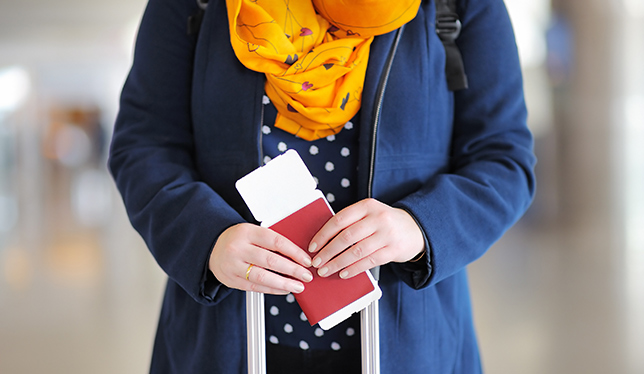Canada’s universities “deeply concerned” by Trump travel ban
The impact of the executive order is “real, immediate and profound,” says Universities Canada head Paul Davidson.

Universities Canada, on behalf of its 97 member institutions, has expressed its “deep concern” about President Donald Trump’s executive order barring travellers from seven countries (Iran, Iraq, Libya, Somalia, Sudan, Syria and Yemen) from entering the United States for 90 days.
The organization stated on Jan. 29 that the U.S. action affects research partnerships, international studies, academic conference participation and more. It added: “Canada’s universities continue to welcome students, faculty and staff from around the world, including those seeking refuge from violence and hardship. They strengthen Canada’s university communities, bringing new knowledge, talent and skills to higher education, research and innovation – to the benefit of all Canadians.”
Individual universities and the Federation for the Humanities and Social Sciences have issued similar statements on the travel ban, which also suspends refugee admissions into the U.S. and has sparked protests over the weekend and into Monday.
“By Sunday morning we were getting serious inquiries from our members about what we could do” as a member organization, said Paul Davidson, president of Universities Canada. He said the last time he remembers getting such a torrent of feedback from members was when the photo of three-year-old Alan Kurdi, a Syrian boy who drowned crossing the Mediterranean Sea and whose body washed ashore, went viral.
“We don’t typically make comments about political situations and policy decisions from other countries,” Mr. Davidson said. “What really catalyzed our decision to act was that the impact of the executive order was real, immediate and profound. Real in that there were international researchers and students on Canadian campuses that were trying to travel to the States on the weekend, and they were turned away.”
There have been several media reports of such cases, including a Toronto resident and MIT researcher who has postponed plans to visit family in Canada next month; a PhD student at Simon Fraser University who will no longer be visiting his brother in New York; and a husband and wife studying at the University of Winnipeg who were not allowed to board a flight to California on Saturday.
Mehrdad Hariri, president of the Canadian Science Policy Centre and a dual Canadian-Iranian citizen, said that Trump’s executive order would “have a huge impact on the scientific research community,” whose success is built upon “collaboration, exchange of ideas and networking.” Dr. Hariri himself had planned to attend a scientific conference in Boston next month, but is being cautious. Though news broke of Canadian dual citizens being exempted, “That remains to be proven at the gates,” he said, recalling his experiences post-9/11. “When you go to the airport, you have to wait and see how this policy is implemented.”
Already, universities are looking at how to help in light of the travel ban, which is being widely discussed on Twitter with the hashtag #MuslimBan. University of British Columbia president Santa Ono has set up a task force with a starting budget of $250,000 to determine how to assist those affected. University of Toronto president Meric Gertler has encouraged faculty and students concerned about travel restrictions to call support lines, as has Elizabeth Cannon, president of the University of Calgary. In addition to its public pronouncement, Universities Canada has been in touch with the Prime Minister’s office and various federal departments “to share information and to provide real examples of what the impacts are” of the travel ban, Mr. Davidson said.
Shortly after it was announced, the Association of Public and Land-Grant Universities and the Association of American Universities issued statements critical of the executive order. The European University Association, representing 850 members in 47 countries, has called on President Trump to “recall or reformulate this executive order to avoid any threat to the free flow of people and knowledge and for the new administration to acknowledge the overall importance of global mobility and openness for society as a whole.”
Featured Jobs
- Canada Excellence Research Chair in Computational Social Science, AI, and Democracy (Associate or Full Professor)McGill University
- Business – Lecturer or Assistant Professor, 2-year term (Strategic Management) McMaster University
- Psychology - Assistant Professor (Speech-Language Pathology)University of Victoria
- Canada Excellence Research Chair in Forest Biodiversity Conservation (Full Professor)University of New Brunswick
- Veterinary Medicine - Faculty Position (Large Animal Internal Medicine) University of Saskatchewan









Post a comment
University Affairs moderates all comments according to the following guidelines. If approved, comments generally appear within one business day. We may republish particularly insightful remarks in our print edition or elsewhere.
4 Comments
Does our inclusion and moral superiority also have room for democracy, the Rule of Law, and sovereignty of foreign states?
Canadian university administrators (many of whom are swift to shut down dissent on their own campuses), while reclining in their executive suites, have suddenly and selectively chosen to protest one policy taken by one foreign democratic state. That noise we hear are hands being collectively wrung and moral outrage on the march. We are told we must all be offended and we must all protest. Are there any limiting factors to Canadian universities committing public money to moderating effects of some policies of certain foreign sovereign states? Are our university presidents going to take over the world? By the way, there is a lot worse public policy in many other countries than the US to which our sanctimonious university presidents have been blind or asleep.
This is absurd. It’s not a ‘ban’. Read the Executive Action! Listen to what Sean Spicer said in the press briefings. I can’t believe the institutes of higher learning in this country are so stupid, following the Liberal-humanist propaganda-driven ‘Corrupt Broadcasting Corporation’ and other similarly skewed news-distorting outlets. No one has been ‘banned’ from entering the US. The executive action requires stricter vetting of travelers from seven nations that engage in poor or non-existence vetting of the travelers leaving their countries, so the US spent a little more time vetting them upon arrival. That’s all. Most Muslim countries, and the Muslim countries with the largest populations, aren’t included on the list! Why are the universities of Canada so politicized, so bent and crooked. Let’s have honest discussion, not blatant slander and libel against other people’s statements, actions and positions. I’m fed up!
Devastated Dominion wrote “It’s not a ‘ban’. Read the Executive Action! […] No one has been ‘banned’ from entering the US.”
Reading the actual Executive Order (not Action) is good advice http://www.nytimes.com/2017/01/27/us/politics/refugee-muslim-executive-order-trump.html
So I did. It states (Sec. 3c): “I hereby suspend entry into the United States, as immigrants and nonimmigrants, of such persons [aliens from Iraq, Syria and other countries (currently 5), designated by the Secretary of State or the Secretary of Homeland Security], for 90 days from the date of this order.”
The Order then goes on to explain that the list will be reevaluated at the end of the 90-day period. No further revision period is mentioned; countries may be added or removed any time after that.
So it’s a ban (no quotes required) which will be in place for at least 90 days.
Honest discussions can’t be based on alternative facts (‘facts’?). That’s why listening to Sean Spicer was not good advice.
Dear Devastated Dominion,
You are absolutely entitled to your opinion, but there is no need to be ‘fed up’, no one has denied any right from you, but from citizens of other nations. We can freely discuss and debate the issue.
Universities’ top administrators have to enter this matter as many of their students, staff, and faculty are nationals of those countries. If they are affected, the whole university is affected. If a faculty cannot go to a conference and disseminate its research at a conference in the US, then his/her whole group is affected, then the taxpayers money is not well-spent. I can bring many examples, but the point is If one simply chooses to ignore the unjust actions and justifies that it does not affect me directly, then he/she can wait and at some point he/she will be targeted too, let alone the short- and long term indirect consequences. That is why we need to stand by each other and protest. Lets not forget that Canada is Canada because of its diversity, openness to the immigrants, and defending the rights of its residents whether citizen or non-citizen.
PS. there is very strict vetting process in place for getting visa to enter US for citizens of those countries. I know for a fact that each time an Iranian applies for a visa, his application is subjected to background check that at least takes 3 weeks, all that for a single entry visa that is valid for 90 days.